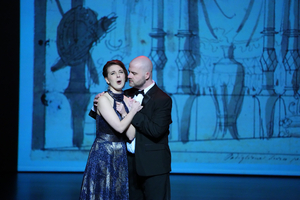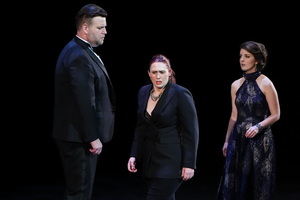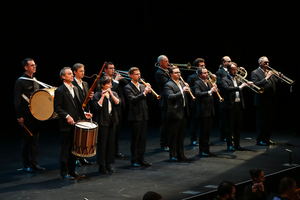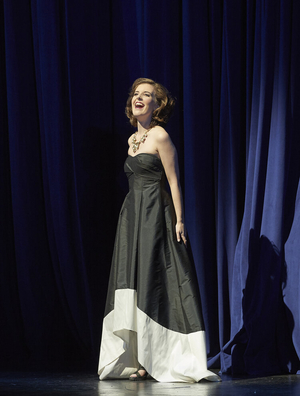Review: Crutchfield's Teatro Nuovo Breathes Life into Rossini's MAOMETTO SECONDO at Rose Theatre
The composer’s much-revised opera--including one version that served as Beverly Sills’ Met debut--may be ready for Prime Time one of these days

It's not very often that audiences get to see one of Gioachino Rossini's serious operas, with companies preferring CENERENTOLA, BARBIERE, ITALIANA IN ALGERI and even COMTE ORY, among others, which can tickle their funny bones.
So the chance to see two of them in close succession seems quite a gift. Opera Philadelphia gave us the composer's alternate universe OTELLO in its late September annual festival, while Will Crutchfield's gutsy Teatro Nuovo brought New Yorkers a chance to evaluate MAOMETTO SECONDO the other day at Jazz from Lincoln Center's Rose Theatre.

Photo: Steven Pisano
How did they fare? They both featured a plethora of tenors and mezzos (with not a soprano in sight except for the chorus!), but OTELLO had the better solo arias--particularly with Lawrence Brownlee and Daniela Mack in fine fettle.
However, I think MAOMETTO--the story of Sultan Mehmed, who with his forces takes the Venetian stronghold of Negroponte, and the Venetian resistance--seemed the better opera, with its nearly four hours moving along rapidly, though its construction seemed at times a little on the odd side.
Kudos to Crutchfield, who continues on his quest for the most authentic of the authentic in bel canto, even when the originals weren't exactly smash hits to begin with. MAOMETTO has had a quite checkered past. The first version was written for the San Carlo Opera in Naples in 1820, then revised drastically for performances in Venice, then more drastic redrafting for Paris, where it turned into LE SIEGE DE CORINTHE in French, then into L'ASSEDIO DI CORINTO in Italian (with some of the original MAOMETTO added in), which was revived for Renata Tebaldi and served as Beverly Sills' debut at the Met, after performances at La Scala.

Photo: Steven Pisano
At the Rose, it was back to the beginning: Naples in 1820. Crutchfield's other innovation in this version was the inclusion of a stage band (standard at the time of the premiere but not used in modern performances), which did some excellent playing while marching across the stage. (The uncredited production was stylishly designed with some sepia illustrations also used to project the supertitles by Lucy Tucker Yates.)
For me, at least, any shortcomings could be forgiven for the appearance of the wildly wonderful mezzo Simone McIntosh.

She was spectacular from start to finish in a role that fit her voice to a tee--and that's saying quite a bit when we're talking about the writing of Rossini at its most devilishly difficult. She even made the libretto by Cesare della Valle seem feasible (or, at least, bearable), dealing with mistaken identities and taking her own life at the end rather than end up with the Sultan. (And she didn't get up to sing one more time while she was dying, because she'd already done a whopper of an aria!)
The others in the central roles were a mixed bag, some of which must be the fault of libretto issues (on Broadway, they call it, "book problems"), others simply because relatively young singers may have needed more seasoning before taking on these difficult roles.
As Maometto (Mehmed), baritone Scott Purcell pulled off the often-taxing music and was dramatically just right. Yet, I found his voice somewhat grainy and the role seemed to lie a bit low for him--a baritone in (perhaps) a bass-baritone's world. There was some good singing from mezzo Hannah Ludwig as Calbo, who was the second in command to Anna's father, Erriso (tenor Nicholas Simpson), and her intended (though he masqueraded as her brother for plot reasons).
While Ludwig started out with some vocal issues, that didn't stop her from becoming an audience favorite by the end. Her duets with McIntosh were solid and their aria in the crypt was particularly fine, as it turned into a trio with Simpson. Simpson showed off an appealing voice, though he disappeared too often in the hand of della Valle's libretto. He was admirable in the 'terzettone'--an extended trio with Maometto and Anna.
The orchestra, using period instruments, did first-rate work on the difficult score, under the leadership of Jakob Lehmann (primo violin e capo d'orchestra) with Lucy Tucker Yates on cembalo (aka, harpsicord). Crutchfield also functioned as chorus master, with stellar results.
The production was originally scheduled for last summer, but was sidelined by Covid. (Who wasn't?) I'm glad they finally got around to doing it--because it was worth the wait.
Reader Reviews

Videos
